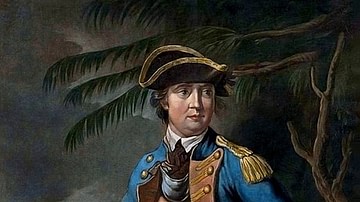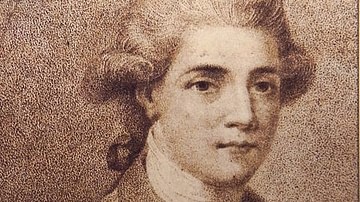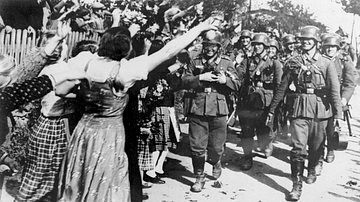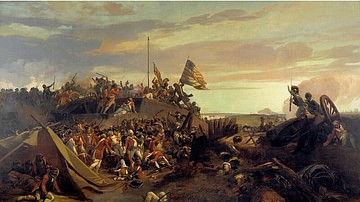Search
Search Results

Definition
John Paul Jones
John Paul Jones (1747-1792) was a Scottish-born sailor who served in the Continental Navy during the American Revolutionary War (1775-1783). His raid on the English port town of Whitehaven in 1778 and his victory over the HMS Serapis the...

Definition
Benedict Arnold
Benedict Arnold (1741-1801) was a general of the Continental Army during the American Revolutionary War (1775-1783). He was considered one of the finest Patriot military officers during the early years of the conflict but defected to the...

Definition
John André
Major John André (1750-1780) was a British military officer who served in the American Revolutionary War (1775-1783). He is best known for negotiating with the American turncoat Benedict Arnold, who offered to hand over the stronghold of...

Image Gallery
5 Maps on the Origins of the United States
In this gallery of five maps, we examine the creation and expansion of the United States from the colonization of North America by European powers to the routes of the explorers who pushed ever westwards to the Pacific coast. Here we can...

Article
Hitler's Occupation of Czechoslovakia
Throughout 1938, Adolf Hitler (1889-1945), the leader of Nazi Germany, threatened to occupy the Sudetenland region of Czechoslovakia. The excuse presented was that Sudeten Germans were being repressed but Hitler was intent on creating a 'Greater...

Article
Colonial American Currency
Colonial American currency was a work in progress from the time of the earliest English settlements of the 1600s until the United States of America minted its own money in 1783. The monetary system was far from standardized, and trade within...

Definition
Indian Princely States
The Indian Princely states (aka Native States or Princely India) were those states in the Indian subcontinent the British did not conquer but which were typically bound by treaty first to the East India Company and then to the British Crown...

Definition
William Wallace
Sir William Wallace (c. 1270-1305) was a Scottish knight and national hero who fought for his country's independence from England. Wallace famously led the Scots to victory against a larger English army at the Battle of Stirling Bridge in...

Definition
William the Silent
William the Silent (l. 1533-1584, also known as William of Orange) was the leader of the Dutch Revolt (the Eighty Years' War) in the Netherlands; first politically (between 1559-1568) then militarily (between 1568-1584). He is among the most...

Article
Siege of Yorktown
The Siege of Yorktown (28 September to 19 October 1781) was the final major military operation of the American Revolutionary War (1775-1783). It resulted in the surrender of British general Lord Charles Cornwallis, whose army had been trapped...